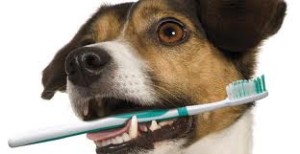Has Your Pet’s Breath Ever Knocked You Over?
 Has your pet had trouble eating? This may be a sign of periodontal disease and gingivitis in your pet. Bacteria will get on your pet’s teeth and start forming plaque. This plaque can then irritate the gums and cause gingivitis and periodontal disease. If left untreated, other organ systems such as the heart, lungs, or kidneys can be affected.
Has your pet had trouble eating? This may be a sign of periodontal disease and gingivitis in your pet. Bacteria will get on your pet’s teeth and start forming plaque. This plaque can then irritate the gums and cause gingivitis and periodontal disease. If left untreated, other organ systems such as the heart, lungs, or kidneys can be affected.
The plaque can be removed with proper brushing, but as the disease worsens, dental calculi or tartar forms. At this stage, the pet’s will need to be placed under anesthesia and have the tartar removed or scaled.
Yearly dental examinations are recommended to help prevent this disease. As a puppy, your veterinarian will look for retained deciduate (baby) teeth, maloclusions, and possible broken teeth. As your pet ages, regular check ups will examine for loose teeth, possible calculi formation, bleeding or swollen gums, root exposure of the teeth and other clinical signs that could be detrimental to your pet. I usually recommend that the small breed dogs start having a check up at one year of age and the large breeds at two years of age.
If your pet’s teeth need to be cleaned, unfortunately they will need to undergo general anesthesia. We always do pre-anesthetic blood work to use assess your pet’s general health and make it as safe as possible. While under anesthesia, the pet will be carefully monitored and maintained under gas anesthesia. At this time, the plaque and calculi will be scaled off with an ultrasonic scaler. The health of the teeth will be assessed and the teeth that have roots exposed, are loose or decayed will possibly be extracted. A polish will be used to smooth the teeth and too help prevent the bacteria from reattaching to the teeth. Other products such as flourides can be used as protectants. However, this doesn’t keep the owners from taking care of the teeth when the pet leaves the clinic.
I recommend that the pet’s teeth be brushed routinely in a circular motion. Other pet or dental chews can be used to help maintain the cleanliness of the teeth. There are also some additives that can be added to your pet’s drinking water that can help freshen it breath.
If you have any questions, don’t hesitate to contact our office. We are here to help!
